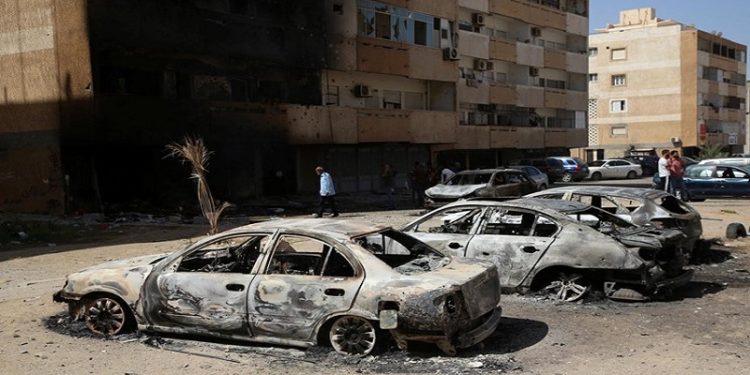INTERNATIONAL
Life on the streets of the Libyan capital appeared to return to normal on Friday, a week after clashes killed more than 30 people and sparked fears of a return to full-blown war.
Fighting erupted on 26 August when rival factions exchanged intense gunfire and several loud explosions rang out across the city.
The UN-backed Government of National Unity (GNU) said the 48-hours of fighting was “triggered by a military group firing randomly at a convoy passing in the Zawia Street area”.
While the clashes have since subsided, heavily armed units continue to patrol the city. Residents spoke of a tense calm in Tripoli, telling Middle East Eye they were avoiding busy areas and restricting their movements in the event of further flare-ups.
Ahmed Alarabi, a 30-year-old resident living near Zawiya Street, said the intense clashes had left fears of further unrest.
Sustained political wrangling
Fears remain that sustained fighting in the capital would likely plunge Libya into full-blown war after two years of comparative peace.
The oil-rich country has been wracked by conflict since a Nato-backed uprising toppled and killed longtime leader Muammar Gaddafi in 2011.
Libya once had one of the highest standards of living in Africa, with free healthcare and free education, but since 2011 has seen frequent fighting and the emergence of several militant groups.
“I spent four hours waiting to get some gasoline. We’re an oil-rich country and this is our situation,” said Khadija El Bory.
“I am tired of this and we want to remove all the current politicians and head to elections.”
The current standoff pits the GNU led by Prime Minister Abdul Hamid Dbeibah against the administration of Fathi Bashagha, which is based in the east of the country.
Tensions have been brewing since December after the country failed to hold elections, with Dbeibah – who was selected in an interim capacity to lead a UN-backed political transition – insisting he would only hand over power to an elected government.
In response, Bashagha has spent months trying to install his government in Tripoli.
Bashagha, who is backed by eastern-based military strongman Khalifa Haftar, attempted to enter Tripoli in May, leading to a shootout and his departure from the city. Since then, however, a series of deals have brought realignments of some armed factions within the main coalitions facing off around Tripoli.
Enas Dakhil, a 38-year-old who lives on Zawiya Street with his family, said ordinary Libyans had nowhere to turn if fighting resumed.
“I would like to leave and be far from the clashes… but can’t leave for anywhere else.”
While Bashagha’s prospects of seizing Tripoli appear badly dented, at least for now, his alliance with Haftar remains an open wound for many in the capital.
The US and some western powers have voiced concern over Haftar’s close ties with Russia, which supports him with mercenaries from the Wagner group.
The role of the Wagner Group in Africa has been in the spotlight since Russia’s invasion of Ukraine in February, with fears that it could further destabilise the region.
Source: Middle East Eye






 WhatsApp us
WhatsApp us 

